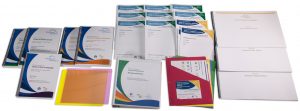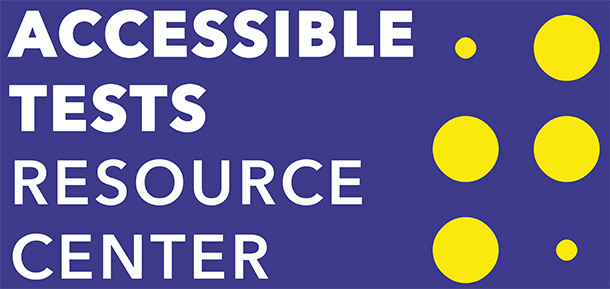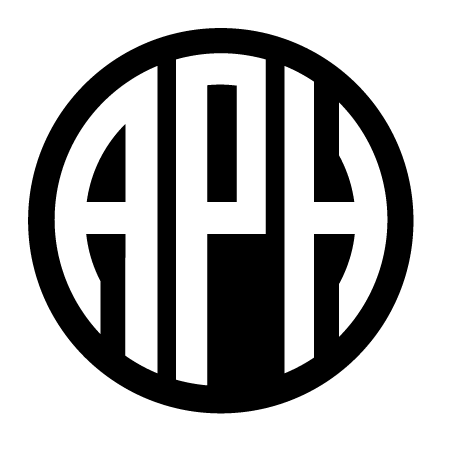Go to navigation for Accessible Tests Resource Center
Accessible Tests Resource Center
Since 2003 the American Printing House for the Blind has maintained a department focused solely on the creation of accessible tests. Through years of experience in providing tests in an accessible format, we have collected information and resources related to the accessibility of tests for students who are blind or visually impaired. We want to share this knowledge with you as we continue to improve accessibility on current and future assessments.
Understanding Types of Assessment
There are many types of assessment, and understanding the differences can be confusing. The terms test, assessment, and exam are often used interchangeably which further adds to the confusion. In order to understand the basics, a comparison of Formative Learning Assessments, Formative Diagnostic Assessments, Benchmark/Interim Assessments, and Summative Assessments is available here based on a chart from Education Week.
Accessible Standardized Tests
The Accessible Tests staff works with publishers on a contractual basis to make assessments accessible for blind and visually impaired students. The forms of assessments made accessible at APH include benchmark/interim, summative, practice, alternate assessments, English learner assessments, college entrance exams, professional exams, and more. Working with all phases of assessment creation, APH assists in bias reviews and item development, the production of hard copy braille, large print and tactile graphics, as well as the creation of alternative text and electronic files for online assessment. All of the work is kept within the parameters set by the test publisher and each state’s educational department in order to maintain the integrity of the content and ensure it is a fair and equitable version of the same test provided for the sighted students.
For more information on the specific services offered, please visit our services page: https://www.aph.org/accessibility-solutions/
Academic Diagnostic Assessments
Assessments classified as diagnostic are administered to provide the administrator the ability to diagnose or determine the student’s Present Level Of Performance, sometimes referred to as PLOP. The administrator can identify the instructional grade level in specific academic areas and provide a snapshot of the areas in which the student needs prescriptive instruction to attain grade level mastery. These assessments are not meant to solely determine the student’s plan, rather they are just one of many components that can be used to evaluate a student.
Each of these assessments are intended to be administered in a one to one testing environment by a qualified administrator. Qualifications for administering these assessments vary with the level of skill required to administer and analyze the results of the assessment. The examiner will also record observations as to how the student attempts various tasks and their level of anxiety or frustration. The obtained results will be used facilitate the writing of the student’s Individualized Education Program (IEP) which will guide the team in delivery of instruction to enable the student to obtain the skills needed.
Assessments are available through the APH catalog and can be purchased with quota funds. Go to https://www.aph.org/shop/
Assessment Tip:
The most important thing when giving an assessment is to know if the student understands what is being asked of them. If the student does not understand the directions, then the outcome has no meaning.
APH has adapted two assessments which measure a child’s understanding of basic concepts such as above, below, and between. Knowledge of these concepts have been determined as an essential skill for increasing a student’s opportunity of achieving success in school. Having an understanding and grasp of these concepts helps children as they learn to describe objects, order events, and understand and describe quantities in normal everyday routines and in extracurricular activities. Children who do not understand these concepts will often struggle in the classroom.
The Boehm-3: Test of Basic Concepts, Third Edition: Preschool and Boehm-3: Test of Basic Concepts, Third Edition, K-2 are assessments which will verify a child’s understanding of these basic concepts; thus, guiding intervention. The Big Picture Edition provides accessibility for students with low vision. The Tactile Edition provides accessibility for students who have little or no vision to access information.
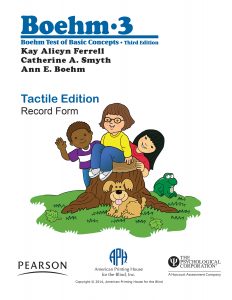
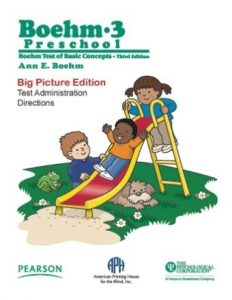 The Boehm-3: Test of Basic Concepts, Third Edition: Preschool measures 26 basic concepts relevant to early childhood curriculum. Each concept is tested twice to verify the child’s understanding.
The Boehm-3: Test of Basic Concepts, Third Edition: Preschool measures 26 basic concepts relevant to early childhood curriculum. Each concept is tested twice to verify the child’s understanding.
Boehm-3: Test of Basic Concepts, Third Edition measures 50 basic concepts relevant to school success. Results help identify students who may not have had the learning experiences necessary to develop an understanding of key concepts.
Visit: https://www.aph.org/shop/ for more information and a list of components included with each kit.
Recently Released:
Woodcock-Johnson IV Adapted for Large Print Readers
A comprehensive set of assessments which can help identify learning problems and improve instructional outcomes. Ages 2 years and up.
Woodcock-Johnson IV Adapted for Large Print Readers
